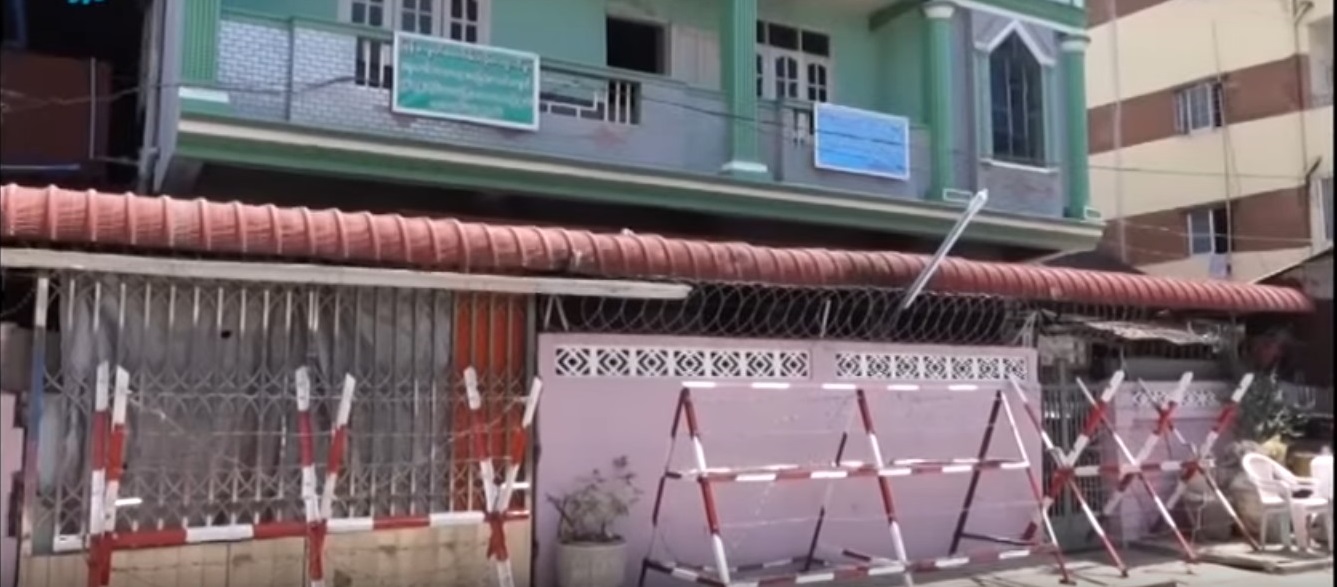Two Muslim schools remain closed in Rangoon’s Thaketa Township as authorities say they are investigating the schools’ eligibility to hold prayer services.
A mob of more than 100 monks and Buddhist supporters arrived outside the schools on Friday afternoon to protest against the schools’ alleged lack of permission to teach religious studies and host Friday prayers.
Rights groups have condemned the outburst and say it is another attempt to bully Burma’s Muslim minority community. In a statement released on Wednesday, the London-based Burma Human Rights Network (BHRN)’s executive director, Kyaw Win, said “the actions of the extremist groups have clearly undermined the rule of law and are part of an increasing trend of groups targeting Muslims.”
BHRN says it has received information that the Islamic school on Anawmar 11 Street had official permission to host prayers, citing documents dating back to 1990. The network says the documents state that the school first hosted prayers in 1959 as a substitute for a madrassa, or Islamic school, and a mosque that authorities demolished in lower Pazundaung Township.
Ultra-nationalists, either unaware of this order or in an act of defiance of it, launched a protest for several hours outside the schools last week and chained their entrances. Police reportedly took no action to stop the protesters.
Kyaw Win believes this latest action calls for authorities to crack down on ultra-Buddhist nationalist groups flexing their muscle and influence. “Authorities have failed to protect the country’s minority Muslim population and have consistently complied with the demands of Buddhist-nationalist extremist groups,” he said.
Wai Phyo Aung, Thaketa’s MP in the Lower House, said government officials are inspecting documents to determine the status of the madrassas and whether they meet the necessary legal requirements.
“Government officials said they inspected the school that day and have presented their findings to relevant authorities at the Ministry of Religious Affairs,” Wai Phyo Aung told DVB.
Last week’s protest was led by a close ally of the notorious nationalist monk Wirathu, known as Taung That Lay Sayadaw and U Thu Sitta. Protest participants were also from the Patriotic Myanmar Buddhist Monk Association and the Patriotic Blood Dhamma Network. Some protesters were reportedly hostile to members of the media and anyone else attempting to take their photos.
[related]
Local resident Sein Sein, who lives in a neighbourhood that includes Buddhist, Muslim and Hindu homes, said she didn’t believe there was a problem with the madrasa on her street. “I don’t know much about it or how the [Muslims] were allowed to [hold prayers] in the past. I only knew that there was a madrasa for orphan children and they pray there sometimes,” she told DVB.
Sein Sein said she didn’t know what kind of permission the madrasa had from authorities, and that “I only know that the venue was first built as a school for children and they were designated a separate location for prayer while the madrasa is only for study.”
Thaketa, a township with a large Muslim population, also made it into the news in 2013, when a similar incident occurred. Some concerned residents told administrators they were worried a school there was being converted into a mosque as renovations began adding to the size of the building. Vandals struck under cover of darkness and some parts of the building were damaged.
Kyaw Win also noted a separate incident two years ago when the heads of eight madrasas in Thaketa were forced to sign an agreement not to hold prayer sessions after the Myochit Dhamma Network petitioned the township administration.
“Any order to ban prayers from Islamic schools is plainly discriminatory and in violation of the basic human rights of the students and teachers to freely practice their religion. Such an order signed under duress or fear of further persecution is even more worrying,” he told DVB via email.
Ultra-nationalist Buddhist groups have also spearheaded a number of anti-Muslim protests in recent years, typically targeting the Rohingya Muslim population in Arakan State. While the focus of nationalists’ ire has been the stateless Rohingya, Muslim communities in cities such as Rangoon and Mandalay, and in villages in Bago Division, Kachin State and elsewhere, have also been subject to anti-Islamic rhetoric and sometimes violent protest.
BHRN says it is worrying that acts of intimidation and violence against Muslims are sometimes ignored by authorities. “Worse still is that the failure by the authorities to take any action against the extremist groups will encourage them to commit further attacks,” said Kyaw Win.



